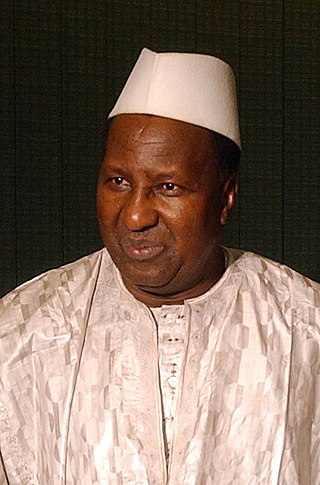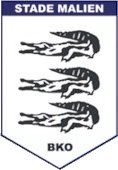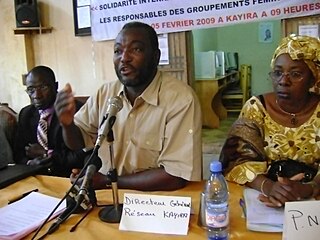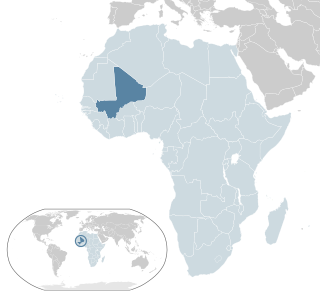
Alpha Oumar Konaré is a Malian politician, professor, historian and archaeologist, who served as President of Mali for two five-year terms from 1992 to 2002 and was Chairperson of the African Union Commission from 2003 to 2008.
The Sudanese Union – African Democratic Rally (US-RDA) was a political party in Mali.
Cheick Oumar Sissoko is a Malian film director and politician.

Soumaïla Cissé was a Malian politician who served in the government of Mali as Minister of Finance from 1993 to 2000.

Salif Keïta Traoré, known as Keita, was a Malian footballer who played as a striker. He was also the first person to receive the African Footballer of the Year award in 1970. He was nicknamed the 'Black Panther'. Which inspired the club

The Alliance for Democracy in Mali – African Party for Solidarity and Justice is a political party in Mali.

African Solidarity for Democracy and Independence is a communist party in Mali. It was founded by Cheick Oumar Sissoko and Oumar Mariko in 1996; Sissoko is the party's President and Mariko is its Secretary-General, the top post in the party. The party is Pan-Africanist in ideology, is affiliated internationally with the International Communist Seminar, a grouping organised by the Workers Party of Belgium, and is in part an outgrowth of the 1991 demonstrations against the military rule of President Moussa Traoré. Mariko was head of the Association of Students and Pupils of Mali (AEEM) during the 1991 protest movement which overthrew the government.

Stade Malien is a Malian professional football and sports club based in Bamako. One of the two dominant clubs of Malian football, their eastern Bamako training grounds host other sports as well, including a successful basketball club.

Articles related to Mali include:
Balla Moussa Keïta was a Malian actor and comedian, and a West African cinema pioneer who was well known in the West. Born in the Ségou Region of Mali as a traditional prince of the Keita dynasty, he was originally a radio producer. He later turned to acting and acted in a number of movies by notable Mali directors like Cheick Oumar Sissoko, Souleymane Cissé and Abdoulaye Ascofaré. Among his critically acclaimed roles are those of the tribal king Rouma Boll in Yeelen and as Mambi in Guimba, un tyrant, une époque. He received the Best Male Interpretation award at the FESPACO for his role in the Guinean film Séré, le témoin.

Oumar Mariko is a Malian politician, doctor and noted former student activist. He is the Secretary-General of African Solidarity for Democracy and Independence (SADI), a left-wing political party, and has three times run for President of Mali, in 2002, 2007 and 2013.

Habib Dembélé is a Malian actor, director, and author, and a candidate for the Malian Presidential elections of 2002 and 2018.
Seydou Badian Kouyaté was a Malian writer and politician. He wrote the lyrics to the Malian national anthem, "Le Mali".
The Malian Party of Labour is a Marxist-Leninist party in Mali and a member of the coalition supporting the Alliance for Democracy in Mali of president Amadou Toumani Touré. Founded in 1965, it was prominent in the student resistance to the 1968-1991 military regime of General Moussa Traoré. It continues as an extra-parliamentary Hoxhaist-Communist faction within the Social-Democratic ADEMA-PASJ coalition, supporters of the Alliance for Democracy and Progress.

Banzumana Sissoko (1890–1987) was a noted Malian Jeli and N'goni player.

Django Sissoko was a Malian civil servant who was Prime Minister of Mali from December 2012 to September 2013. He was Minister of Justice from 1984 to 1988 and subsequently served twice as Secretary-General of the Presidency, from 1988 to 1991 and from 2008 to 2011. He also served as Ombudsman from 2011 to 2012.
Events in the year 2018 in Mali.

The 1968 Malian coup d'état was a bloodless military coup in Mali staged on 19 November 1968 against the government of President Modibo Keïta. The coup was led by Lieutenant Moussa Traoré, who then became the head of state.











